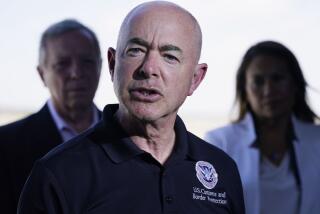Bosnia Risks Too High for Intervention, Eagleburger Says
- Share via
WASHINGTON — Despite growing evidence of freezing and starvation among the populace in Bosnia-Herzegovina, the United States and its allies simply are unwilling to take the military risks that would be necessary to alleviate the suffering, Secretary of State Lawrence S. Eagleburger said Saturday.
The Bush Administration has concluded that only a massive deployment of ground troops would be enough to protect relief convoys in Bosnia, Eagleburger said, because air power alone would not suffice. He said Washington and its allies are unwilling to go that far, despite President Bush’s promise last summer to do “anything it takes” to get food and medicine through.
He said punitive air strikes against Serbia might force the Belgrade government and its ethnic allies to lift the siege of Bosnia. But he quickly added, “You can’t be sure it would work, and if it doesn’t, what’s your next step?
“Each one of these issues has to be looked at as a possible escalation which, if it doesn’t work, leads you to think about what the next thing you do is,” he said. “None of the parties that I know about is prepared to take that kind of chance. Maybe the new Administration will be. Whether they can convince the allies is another thing.”
In a frequently introspective interview marking the final days of his 35-year diplomatic career, the usually ebullient Eagleburger offered a sober assessment of the post-Cold War world. He said President-elect Bill Clinton and his Administration must come to grips with the reality that the United States cannot solve all of the world’s problems.
“It is damn well about time that we all recognize that there are some problems that simply can’t be solved or at least that can’t be solved without great cost, and you have to analyze whether the cost is worth it,” he said. “It is not our responsibility every time something like this happens that we have to bear the guilt of not being able to solve it.”
He conceded that it is Washington’s responsibility to hammer together a political solution for Haiti that would improve the lives of average Haitians enough to stop them from trying to reach the United States in small boats. He said the Bush Administration failed to resolve the crisis, leaving it as one of the first things the Clinton Administration must do.
Eagleburger said the only possible long-term solution is to restore democratically elected President Jean-Bertrand Aristide to power. But he conceded he did not know how to do that because of the bitter hatred between Aristide and the military leaders who overthrew him in September, 1991.
Eagleburger is a former U.S. ambassador to Yugoslavia who spent about seven years in Belgrade in a variety of diplomatic jobs.
“I’m bothered by it (the fighting in the Balkans) on a personal level, but I’m not as bothered by it professionally as I am sure you think I should be,” he said. “If these people are intent on killing each other for what any sane American has to judge are totally irrational reasons . . . then the ability of the United States to cope with that, particularly alone, has to be recognized to be limited. . . . It is a problem for which at this stage there is no answer that is within the realm of what any of the major powers are prepared to do.”
In an earlier interview, Eagleburger complained that U.S. allies had “dithered” so long at the United Nations over a U.S. proposal to use allied warplanes to enforce a “no-fly zone” over Bosnia that most of the impact of the action--if it ever takes place--has been lost. On Saturday, he said that his criticism was limited to the U.N. discussions and that he had not meant to imply that the United States had any ready answers either.
“I won’t argue that the United States has had a clear view of how to deal with it--we haven’t,” he said. But he said the reluctance to authorize a relatively risk-free enforcement of the no-fly zone dramatizes the difficulty that would be encountered should the West consider the far more dangerous course of protecting relief convoys.
“If we are unwilling to enforce the no-fly resolution, it is hard to imagine how we can get agreement on more forceful action with regard to getting the humanitarian supplies in,” he said.
On other topics in the 45-minute interview, Eagleburger:
* Recalled that the “low point” of his diplomatic career was the Watergate scandal because it so distracted the Richard M. Nixon Administration that the U.S. government “could not have moved a platoon” of troops to respond to an international crisis. He said that then-Secretary of State Henry A. Kissinger “played with mirrors enough that the Soviet Union never figured out how unable we would have been to respond to any challenge.”
* Said the “high point” of his tenure was the peaceful collapse of communism in the Soviet Union and Eastern Europe and the way in which the Bush Administration dealt with the changes.
* Asserted that Iraqi President Saddam Hussein and his military will not be a danger to world peace or Middle East stability as long as the international community maintains economic and diplomatic sanctions.
He said the United States may have to “give him one in the chops” from time to time but predicted Hussein will not become a major problem.
* Said that Clinton, whose campaign rhetoric was unabashedly pro-Israel, must find some way to reassure the Arab world that the United States can be trusted as an honest broker in the Arab-Israeli conflict. He said former Secretary of State James A. Baker III established such a relationship with the Arabs.
* Predicted that Clinton will not change Washington’s hostile relationship with Cuba because there are no pressing reasons to do so and because the politically influential Cuban exile community, which opposes any change, is too strong to challenge.
More to Read
Get the L.A. Times Politics newsletter
Deeply reported insights into legislation, politics and policy from Sacramento, Washington and beyond. In your inbox twice per week.
You may occasionally receive promotional content from the Los Angeles Times.







